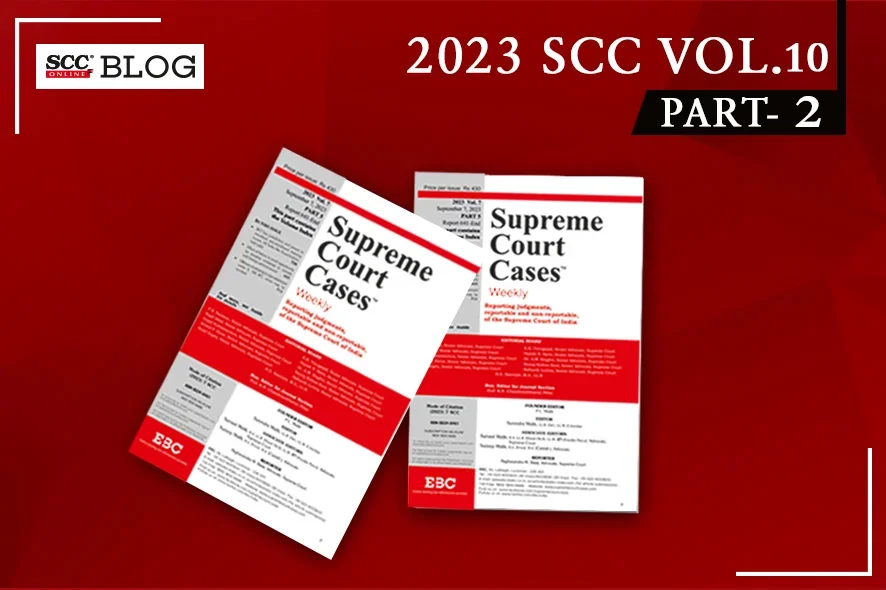Penal Code, 1860 — Ss. 302 and 201 — Circumstantial evidence — Last seen theory and recovery of weapon: In this case, accused husband allegedly killed his wife by means of a knife, because of her adulterous relationship. Furthermore, though his wife went missing on 28-5-2004, he lodged the missing report on 31-5-2004, though dead body recovered on 30-5-2004, hence, conviction was reversed. [Sharanappa v. State of Karnataka, (2023) 10 SCC 168]
Criminal Procedure Code, 1973 — S. 154 — FIR: Law summarised relating to delay in lodging FIR, when not fatal. [Kamal Prasad v. State of Chhattisgarh, (2023) 10 SCC 172]
Criminal Procedure Code, 1973 — S. 216 — Alteration or addition of charge by appellate court: In view of the wide powers conferred by S. 386, even an appellate court can exercise the power under S. 216 of altering or adding the charge. However, if appellate court intends to do so, elementary principles of natural justice, require appellate court to put the accused to the notice of the charge proposed to be altered or added when prejudice is likely to be caused to the accused by alteration or addition of charges i.e. in case falling under S. 216(4). [Chandra Pratap Singh v. State of M.P., (2023) 10 SCC 181]
Insolvency and Bankruptcy Board of India (Liquidation Process) Regulations, 2016 — Sch. I — Liquidation of corporate debtor — Auction-sale — Cancellation of — Discretion of Liquidator: Mere expectation of obtaining a higher price is insufficient to cancel an otherwise valid auction-sale. Extent of discretion of Liquidator re cancellation of auction-sale and manner in which it is to be exercised, clarified. [Eva Agro Feeds (P) Ltd. v. Punjab National Bank, (2023) 10 SCC 189]
Penal Code, 1860 — Ss. 302/34: Accused-appellants in this case, allegedly intentionally committed murder of one person, who was Sarpanch of village concerned, by shooting him, however, identity of accused was not validly established in court. Hence, conviction was reversed. [Dharma v. State of Haryana, (2023) 10 SCC 229]
Securitisation and Reconstruction of Financial Assets and Enforcement of Security Interest Act, 2002 — S. 13(8) r/w R. 9(4) of the 2002 Rules — Auction-sale — Bid amount: As per R. 9(4) of the 2002 Rules, balance amount of purchase price payable has to be paid by purchaser to authorised officer on or before fifteenth day of confirmation of sale or such extended period as may be agreed upon in writing between purchaser and secured creditor, in any case not extending beyond three months. Moreover, S. 148 CPC does not permit court to extend time-limit beyond thirty days of time-limit fixed by court earlier. Even plenary powers of Supreme Court under Art. 142 of the Constitution cannot be invoked to supplant substantive law. [Union Bank of India v. Rajat Infrastructure (P) Ltd., (2023) 10 SCC 232]
Specific Relief Act, 1963 — Ss. 38 and 34 — Maintainability of suit for permanent injunction — Declaration of title: There is no need to claim a declaration of title where there is no cloud of doubt over title. [K.M. Krishna Reddy v. Vinod Reddy, (2023) 10 SCC 248]
E.P. Urban Rent Restriction Act, 1949 (3 of 1949) — Ss. 13-B and 18-A — Eviction of tenant: In case of rejection of leave to defend eviction proceeding, when interference with findings of fact is warranted, explained. [Shanta Rani v. Nasib Kaur, (2023) 10 SCC 258]
Penal Code, 1860 — Ss. 304 Pt. II [S. 300 Exception 4] and 506 Pt. I: In this case, as repeated blows on face of deceased by appellant-accused, eventually led to his death on next day in hospital, conviction of appellant under Ss. 304 Pt. II and 506 Pt. I, was confirmed. [Panneer Selvam v. State of T.N., (2023) 10 SCC 265]
Penal Code, 1860 — S. 304-B — Dying declaration — Conviction when may be based solely on: Before basing conviction solely on dying declaration, the court must come to a conclusion that the dying declaration is trustworthy, reliable and one which inspires confidence. [Phulel Singh v. State of Haryana, (2023) 10 SCC 268]
Constitution of India — Arts. 32 & 226 and Art. 13 and Art. 245 — Scope of judicial review of primary legislation: Judicial review is powerful weapon to restrain unconstitutional exercise of power by legislative and executive. However, while doing so, Court must remain within its self-imposed limits and cannot declare statute enacted by Parliament or State Legislature unconstitutional, unless there is flagrant violation of constitutional provisions. CVC (Amendment) Act, 2021, the Delhi Special Police Establishment (Amendment) Act, 2021 and Fundamental (Amendment) Rules, 2021, constitutionally valid. [Jaya Thakur v. Union of India, (2023) 10 SCC 276]







